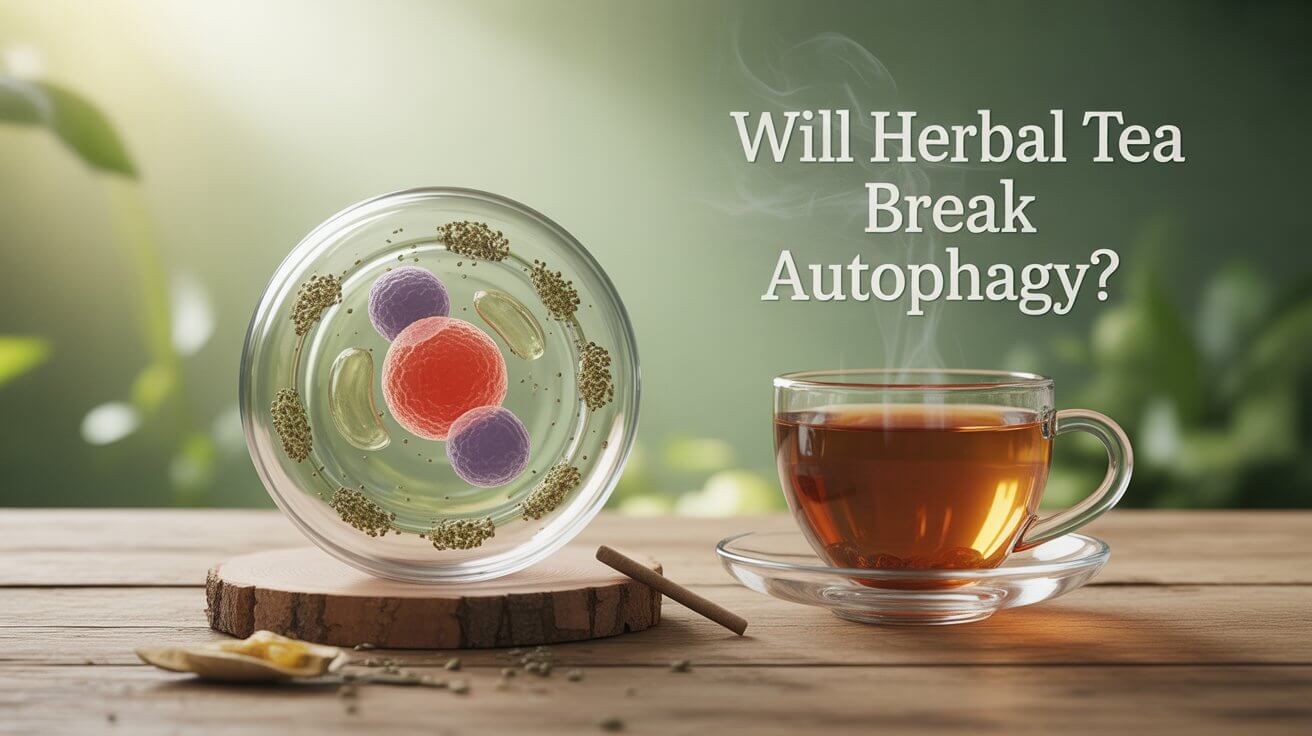Autophagy has become one of the most talked-about processes in the wellness world and for good reason. It’s your body’s built-in “self-cleaning” mechanism, responsible for breaking down damaged cells and renewing them for better health, longevity, and performance.
If you’re practicing intermittent fasting or extended fasts, you’ve likely wondered: will herbal tea break autophagy?
The short answer: pure, unsweetened herbal tea does not break autophagy and may even enhance it. Let’s explore why this is the case and which teas can support your fasting goals.
What Is Autophagy and Why It Matters
Autophagy (from the Greek for “self-eating”) is the body’s natural way of recycling old or damaged cells into new, healthy components. This cellular renewal process is linked to:
-
Improved brain function and cognitive protection
-
Faster metabolism and energy efficiency
-
Longevity and anti-aging benefits
-
Enhanced muscle recovery
-
Reduced inflammation and oxidative stress
Research from 2024 in Cell Metabolism shows that autophagy plays a key role in metabolic health and cellular detox making it one of the main reasons fasting has such powerful health benefits.
Does Herbal Tea Break a Fast or Autophagy?
Most pure herbal teas are naturally calorie-free, sugar-free, and non-insulin-stimulating, meaning they do not interfere with fasting or autophagy.
The goal during fasting is to avoid anything that spikes insulin or provides enough nutrients to “signal” the body to stop repairing cells. Since most herbal teas contain only trace compounds (like antioxidants or essential oils), they don’t interrupt the process.
However, not all teas are created equal some may unintentionally break your fast if they include:
-
Added sugar, honey, or sweeteners
-
Dried fruit pieces that release natural sugars
-
Artificial flavors or syrups
-
Creamers or milk
Rule of thumb: If the label lists only herbs or flowers (like chamomile, ginger, peppermint), it’s safe for autophagy.
How Herbal Tea Supports Autophagy
Instead of disrupting fasting, certain teas actually enhance autophagy through their natural plant compounds. Here’s how:
-
Green tea: Contains catechins and EGCG, which may stimulate autophagy and fat oxidation.
-
Rooibos tea: Packed with antioxidants that reduce oxidative stress and support cellular repair.
-
Ginger tea: Improves digestion and may help the body eliminate toxins more efficiently.
-
Peppermint tea: Calms the digestive system and reduces cravings during fasting.
-
Chamomile tea: Promotes relaxation, lowers inflammation, and supports recovery.
A 2024 study in the Journal of Nutritional Biochemistry confirmed that polyphenols abundant in herbal teas help activate key pathways involved in autophagy, especially when combined with fasting.
Best Herbal Teas for Fasting and Cellular Renewal
If you want to enjoy tea without interrupting your fast or autophagy, these options are the best choices:
| Tea Type | Key Benefits | Fasting Safe? |
|---|---|---|
| Green Tea | Boosts metabolism, supports fat burning, enhances autophagy | ✅ Yes |
| Chamomile Tea | Promotes calm, reduces inflammation, supports detox | ✅ Yes |
| Peppermint Tea | Curbs appetite, eases digestion, relieves bloating | ✅ Yes |
| Rooibos Tea | Caffeine-free, rich in antioxidants for cellular protection | ✅ Yes |
| Ginger Tea | Stimulates digestion, supports detox pathways | ✅ Yes |
All of these teas work synergistically with fasting, keeping your system hydrated and your energy levels stable.
Precautions and Tips
While herbal teas are safe for most people, here are a few important reminders:
-
Avoid teas with added sugar, honey, or fruit pieces.
-
Be cautious with “detox teas” that contain strong laxatives like senna.
-
If you’re taking medication, consult your healthcare provider some herbs can affect absorption.
-
Alternate tea with water to stay well hydrated during fasts.
For those seeking a gentle, metabolism-supporting tea, All Day Slimming Tea is an excellent option. It combines herbs like green tea, oolong, and ginger promoting fat burning, detoxification, and digestion while remaining fasting- and autophagy-friendly.
Final Verdict: Does Herbal Tea Break Autophagy?
So, will herbal tea break autophagy?
No not if it’s pure and unsweetened.
In fact, herbal teas can support autophagy by reducing inflammation, aiding digestion, and delivering antioxidants that complement your body’s repair mechanisms.
When chosen wisely, herbal tea is the perfect companion to fasting, helping you stay hydrated, focused, and in tune with your body’s natural rhythm of renewal.


Leave a Reply